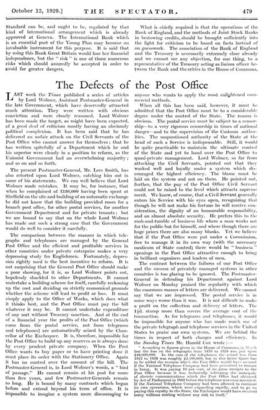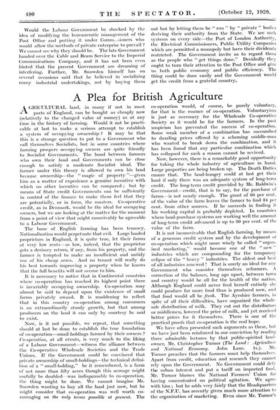The Defects of the Post Office
.AST week the Times published a series of articles 4 by Lord Wolmer, Assistant Postmaster-General in the late Government, which have deservedly attracted much attention. They were written with obvious conviction and were closely reasoned. Lord Wolmer has been niade the target, as might have been expected, of a good deal of criticism mostly having an obviously political complexion. It has been said that he has delivered an unfair attack on the Civil Servants of the Post Office who cannot answer for themselves ; that he has written spitefully of a Department which he and his superior were clearly in a position to reform, as the Unionist Government had an overwhelming majority ; and so on and so forth.
The present Postmaster-General, Mr. Lees Smith, has also retorted upon Lord Wolmer, catching him out in some of his statements. We can well believe that Lord Wolmer made mistakes. It may be, for instance, that when he complained of £136,000 having been spent at Sheffield on the site and building of an automatic exchange he did not know that the building provided room for a branch post office, for other postal services, for another Government Department and for private tenants ; but we are bound to say that on the whole Lord Wolmer has -made out such a strong case that the Government would do well to consider it carefully.
The comparison between the manner in which tele- graphs and telephones are managed by the General Post Office and the efficient and profitable services in other countries under private enterprise makes a very depressing study for Englishmen. Fortunately, depres- sion rightly used is the best incentive to reform. It is not surprising that the General Post Office should make a poor showing, for it is, as Lord Wolmer points out, hopelessly shackled to other Departments. It cannot undertake a building scheme for itself, carefully reckoning up the cost and deciding on strictly economical grounds whether the scheme will lead to profit or loss. It must simply apply to the Office of Works, which does what it thinks best, and the Post Office must pay the bill whatever it may be. It cannot undertake expenditure of any sort without Treasury sanction. And at the end of a financial year the profits of the Post Office (which come from the postal service, not from telegrams and telephones) are automatically seized by the Chan- cellor of the Exchequer. It is, therefore, impossible for the Post Office to build up any reserves as is always done by every prudent private company. When the Post Office wants to buy paper or to have printing done it must place its order with the Stationery Office. Again it has no control over the amount of the bill. The Postmaster-General is, in Lord Wolmer's words, a " bird of passage." He cannot remain at his post for more than five years, and few Postmaster-Generals remain so long. He is bound by many contracts which began before and extend beyond his term of office. It is impossible to imagine a system more discouraging to anyone who wants to apply the most enlightened com- mercial methods.
When all this has been said, however, it must be admitted that the Post Office must be to a considerable degree under the control of the State. The reason is obvious. The postal service must be subject to a censor- ship—to a very rigorous censorship in times of national danger—and to the supervision of the Customs author- ities. The unquestioned authority of the State at the head of such a Service is indispensable. Still, it would be quite practicable to maintain the ultimate control of the State and yet to hand over the Post Office to quasi-private management. Lord Wolmer, so far from attacking the Civil Servants, pointed out that they worked well and loyally under a system which dis- couraged the highest efficiency. The blame must be laid on the system and not on them. He pointed out, further, that the pay of the Post Office Civil Servant could not be raised to the level which attracts supreme merit. We know, of course, that a Civil Servant generally enters his Service with his eyes open, recognizing that though he will not make his fortune he will receive con- sideration, the dignity of an honourable responsibility, and an almost absolute security. He prefers this to the rush-and-tumble of business life where a man works not for the public but for himself, and where though there arc huge prizes there are also many blanks. Yet we believe that if the. Post Office were put under a Commission, free to manage it in its own way (with the necessary modicum of State control) there would be " business " openings in the Post Office attractive enough to bring in brilliant organisers and leaders of men.
The contrast between the failures of our Post Office and the success of privately managed systems in other countries is too glaring to be ignored. The Postmaster- General in defending his Department against Lord Wolmer on Monday praised the regularity with which the enormous masses of letters are delivered. We cannot say that we are impressed. The postal service is in some ways worse than it was. It is not difficult to make a profit on the collection and delivery of letters. The lid. stamp more than covers the average cost of the transaction. As for telegrams and telephones, it would be impossible for anyone who has made much use of the private telegraph and telephone services in the United States to praise our own systems. We are behind the times in respect of both charges and efficiency. In the Sunday Times Mr. Harold Cox wrote :- "According to figures given in the House of Commons in March last the loss on the telegraphs from 1870 to 1928 was just upon £46,000,000. In the case of the telephones the actual loss from 1912 to 1928 was roughly £2,500,000, but to this latter figure has to be added the revenue which the Post Office would have secured if the National Telephone Company had been permitted to remain in being. It was paying 10 per cont. of its gross receipts to the Post Office because it was technically infringing the monopoly of electric communications which the Post Office had obtained by Act of Parliament in 1869 before the telephone was even invented. If the National Telephone Company had been allowed to continue its own operations, which were expanding rapidly, and to go on paying this royalty to the State, the Exchequer would have received many millions sterling without any risk to itself." Would the Labour Government be shocked by the idea of modifying the bureaucratic management of the Post Office and putting it under Comm,.sioners who would allow the methods of private enterprise to prevail ? We cannot see why they should be. The late Government handed over the Cable and Beam Service to the Imperial Communications Company, and it has not been even hinted that the present Government are dreaming of interfering. Further, Mr. Snowden himself has on several occasions said that he believed in socializing- many industrial undertakings, not by buying them out but by letting them be " run by " private " bodies deriving their authority from the State. We see such systems on every side—the Port of London Authority, the Electrical Commissioners, Public Utility Companies which are permitted a monopoly but have their dividends restricted. The Government invite us to regard them as the people who " get things done." Decidedly they ought to turn their attention to the Post Office and give us both public economy and public efficiency. The thing could be done easily and the Government would get the credit from a grateful country.









































 Previous page
Previous page